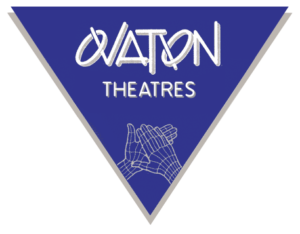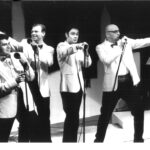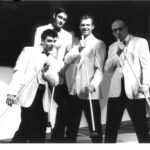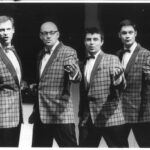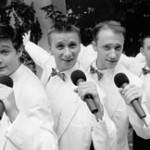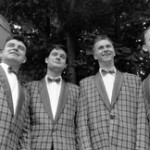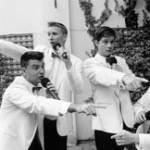FOREVER PLAID
by Stuart Ross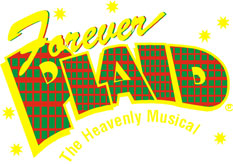
When most of us think of the 1950s, we think of Rock ‘n’ Roll, hot rods, Elvis, D.A. haircuts and teenage rebellion. But there was a “flipside” to this era – the side of harmony, innocence and the sincerity of dreams. When American families gathered in front of the TV to watch their favourite variety shows, like Ed Sullivan or the Perry Como Show. A period when four-part vocal groups harmonised their way across the airwaves, jukeboxes and hi-fi’s of the country. Throughout the land they would stand at a quartet of microphones, crooning a multitude of chaperoned party-goers into dreamy romance. They wore dinner jackets and bow ties. Each move was drilled in precision. Each vocal arrangement soared stratospheric heights of harmony. These groups got together to sing and rehearse in their basements. If things worked out they might be hired to sing at weddings, conventions and country club socials. Inspired by the success of their favourite recording stars, they made plans to climb that spiral staircase to fame and fortune.
This is the story of such a group – FOREVER PLAID
There were these four guys, Sparky, Smudge, Jinx and Frankie, who loved to sing. They all met in high school around 1956. Discovering that they shared an affection for music and entertaining, they got together and dreamed of becoming like their idols – The Four Aces, The Four Freshmen, The Hi-Lo’s and The Crew Cuts. They rehearsed in the basement of Smudge’s family’s plumbing supply company. It was here they became FOREVER PLAID. Although Rock ‘n’ Roll was racing down the fast lane like a candy-apple Corvette, they believed in their music. As their sound developed , they sang at family gatherings, fund raisers and eventually graduated to supermarket openings and local hops. Finally on 9th February 1964 they landed their first big gig – the Airport Hilton Cocktail Bar. On this day our story begins…
Upstairs At The Gatehouse | December 1998 - January 1999
CAST
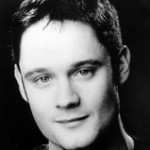 Jinx in Ovation’s Christmas production of Forever Plaid was Andrew’s first role after graduating from Mountview Theatre School at the end of last year. Since then he has played the leading role, Iain McGregor, in the workshop production of the new musical Macgregor, and has sung in a music video as well as performing in several improvisation workshops. At Mountview, Andrew’s roles included Bobby in Company, Lysander in A Midsummer Night’s Dream and Action in West Side Story. Andrew is an accomplished writer and has won many national and international awards for his radio plays.
Jinx in Ovation’s Christmas production of Forever Plaid was Andrew’s first role after graduating from Mountview Theatre School at the end of last year. Since then he has played the leading role, Iain McGregor, in the workshop production of the new musical Macgregor, and has sung in a music video as well as performing in several improvisation workshops. At Mountview, Andrew’s roles included Bobby in Company, Lysander in A Midsummer Night’s Dream and Action in West Side Story. Andrew is an accomplished writer and has won many national and international awards for his radio plays.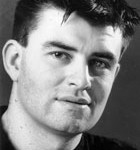 Tim graduated from Mountview Theatre School in 1995. He has just starred in a brand new musical Kids Need Friends performed in the presence of HRH The Prince of Wales and The Laughter Makers in Exeter with Robert Powell and Barry Cryer. Tim presented The Wonderful West End at Litchfield and supported Bobby Davro at Bridlington. Recently Tim guested at the Jermyn Street Theatre in An Evening with Paul Hull and Simply Barbra with Steven Brinberg. Other credits include many theatre roles, Radio 2’s A Chorus Line and Kiss Me Kate. Future plans: two handers with Barb Jungr and Helen Lederer, The Laughter Makers, From Stage to Screen and Tim’s cabaret show A Little Romance in the Dark.
Tim graduated from Mountview Theatre School in 1995. He has just starred in a brand new musical Kids Need Friends performed in the presence of HRH The Prince of Wales and The Laughter Makers in Exeter with Robert Powell and Barry Cryer. Tim presented The Wonderful West End at Litchfield and supported Bobby Davro at Bridlington. Recently Tim guested at the Jermyn Street Theatre in An Evening with Paul Hull and Simply Barbra with Steven Brinberg. Other credits include many theatre roles, Radio 2’s A Chorus Line and Kiss Me Kate. Future plans: two handers with Barb Jungr and Helen Lederer, The Laughter Makers, From Stage to Screen and Tim’s cabaret show A Little Romance in the Dark.CREATIVES
 John trained at LAMDA and spent several years in Rep including a long stay at the Theatre Royal, Windsor. He has directed and produced numerous shows including many for cruise lines Cunard and P & O. At Upstairs at the Gatehouse John has directed Forever Plaid (also Edinburgh and National Tour) From a Jack to a King, It’s Only Make Believe (which he co-wrote) and A Slice of Saturday Night. John is very much involved in the day to day administration of Ovation Theatres and Upstairs at the Gatehouse.
John trained at LAMDA and spent several years in Rep including a long stay at the Theatre Royal, Windsor. He has directed and produced numerous shows including many for cruise lines Cunard and P & O. At Upstairs at the Gatehouse John has directed Forever Plaid (also Edinburgh and National Tour) From a Jack to a King, It’s Only Make Believe (which he co-wrote) and A Slice of Saturday Night. John is very much involved in the day to day administration of Ovation Theatres and Upstairs at the Gatehouse. Racky trained on the Musical Theatre course at the Arts Educational School in London. Whilst there she appeared in and stage-managed many of the school’s productions including Tin Pan Alley and Dracula Spectacula. She stage-managed Peter Schaffer’s Black Comedy at the Bedlam Theatre during the 1996 Edinburgh Festival. Racky also choreographed Ovation’s production of Forever Plaid, Upstairs at the Gatehouse in Highgate. Racky’s aspirations lie in performing as well as wishing to further her career in choreography.
Racky trained on the Musical Theatre course at the Arts Educational School in London. Whilst there she appeared in and stage-managed many of the school’s productions including Tin Pan Alley and Dracula Spectacula. She stage-managed Peter Schaffer’s Black Comedy at the Bedlam Theatre during the 1996 Edinburgh Festival. Racky also choreographed Ovation’s production of Forever Plaid, Upstairs at the Gatehouse in Highgate. Racky’s aspirations lie in performing as well as wishing to further her career in choreography.PHOTOS
REVIEWS
Upstairs at the Gatehouse marked its first anniversary in some style last week with its first ever home-grown production, and there was a packed house to enjoy a special festive preview.
Forever Plaid, which started off-Broadway and last played in this country In the West End in 1993, is an intimate tribute to the ‘50s, an era of innocence and close harmony summed up by crooners of the Perry Como ilk.
Our eponymous quartet, though, find their careers cut short, not so much by the rise of rock ‘n’ roll, but by the fact that – on their way to their first major gig at the Airport Hilton Cocktail Bar – they are killed in collision with a bus full of Beatles fans.
Their performance is by way of an attempt to find celestial harmony and peace on that great stage in the sky. It’s the greatest comeback since Lazarus, remarked one of their tuxedoed number.
Hey, plaid may not have been hip, but in the string of numbers that comprise the show – Love is a Many Splendored Thing, 16 Tons, Catch a Falling Star, Perfidia and many more – you would almost think its cool to be square.
Add to that the best use of giant sink plungers and a three-minute version of the Ed Sullivan Show and you have something that’s as wholesome as apple pie.
John Plew’s appealing production ensures that is all stays cute rather than corny, though at time the vocal precision of his excellent cast – Michael Bernadin, Andrew Emerson, Tim McArthur and Colin Salway – isn’t quite matched by the same snappiness of presentation.
After a fine year for this venue, though, there is certainly plenty to sing about in these plaid tidings.
In the programme for this charming production of Stuart Ross’s Forever Plaid, director John Plews explains that his aim in the return the piece to its “intimate Off-Broadway roots” – a philosophy which has certainly paid off.
Although the show enjoyed great success in America in the early nineties, London audiences were less receptive when it opened at the West End’s Apollo Theatre. However, that is hardly surprising – Forever Plaid is perfect for an intimate space such as Upstairs at the Gatehouse, but it would be lost if staged anywhere considerably bigger.
The story is silly, simple and entertaining – in February 1964 the members of a promising close-harmony group are on their way to their first big gig when they are killed in a car crash. But through the wonders of science, they now have the opportunity to perform the gig they never got to do while alive.
Countless musical numbers reminiscent of the fifties are brought to life by an extremely talented foursome, revealing great talent for both singing and acting. Andrew Emerson not only produces some beautiful vocals for Cry, but he also has a knack for comedy, as does Tim McArthur, who can play the clown as well as offer a poignant rendition of Catch a Falling Star. Joined by Michael Bernardin and Colin Salway (also musical director), who are impressive, the team appears to have great fun on the way to a rousing finish. Racky ensures the space is used to its best advantage with some slick choreography, while Sarah Williamson (set) and Les Broughton (lighting) also deserve a mention. Musicians Michael Roulston and Tim Hussain provide excellent accompaniment. The venue is certainly celebrating its first birthday in style.
The best musical piece in London over the holidays.
Whether you consider this a piece of theatre of cabaret, when it is done correctly the result is the same, the show transports you back to the innocent days of the 1950s when music still has a sense of fun and the songs of love were the moon and June variety. Political correctness and the New Man hasn’t yet reared their heads to demand more. This production achieved everything the show should and being Christmas, it was, for me, the best musical piece in London over the holidays.
The cast comprised of Tim McArthur, Michael Bernardin, Andrew Emerson and Colin Salway, as the luckless group who, having been killed in a car crash in the 50s get a second chance to perform their concert in 1998. This provides the excuse to perform all those wonderful songs like ‘Magic Moments’, and ‘Catch A Falling Star’. Andrew did a particularly beautiful rendition of ‘Cry’ and Tim’s ‘Perfidia’ was an extremely athletic performance. The staging was kept suitably simple with a New York skyline complete with twinkling lights and an occasional theatre curtain. A great deal of humour in the synchronized movements of the four Plaids was evident as well as the use of various props – ‘Crazy Bout Ya Baby’ included sink plungers! All four cast members sang well and the harmonies were superb. Mention should also be made of the two excellent musicians, Michael Roulston and Tim Hussain. I couldn’t think of a better way of spending two hours. It was pure joy.
Edinburgh & UK Tour | 1999
CAST
 Richard graduated this year with a music degree from Bristol University. During his time as a student he played a wide range of parts including Stanley Kowalski in A Streetcar Named Desire, Tybalt in Romeo and Juliet, Johnny in Anthony Minghella’s Hang Up, ultimately winning a national prize for acting at this year’s National Student Drama Festival for his portrayal of Captain Stanhope in R.C. Sheriff’s play Journey’s End. Until recently Richard was the resident singer at the popular Bristol nightspot Byzantium. He has also played the role of Figaro in La Nozze de Figaro, Jesus in John Stainer’s oratorio The Crucifixion and sung a solo recital at the South Bank’s Purcell Room.
Richard graduated this year with a music degree from Bristol University. During his time as a student he played a wide range of parts including Stanley Kowalski in A Streetcar Named Desire, Tybalt in Romeo and Juliet, Johnny in Anthony Minghella’s Hang Up, ultimately winning a national prize for acting at this year’s National Student Drama Festival for his portrayal of Captain Stanhope in R.C. Sheriff’s play Journey’s End. Until recently Richard was the resident singer at the popular Bristol nightspot Byzantium. He has also played the role of Figaro in La Nozze de Figaro, Jesus in John Stainer’s oratorio The Crucifixion and sung a solo recital at the South Bank’s Purcell Room. Jinx in Ovation’s Christmas production of Forever Plaid was Andrew’s first role after graduating from Mountview Theatre School at the end of last year. Since then he has played the leading role, Iain McGregor, in the workshop production of the new musical Macgregor, and has sung in a music video as well as performing in several improvisation workshops. At Mountview, Andrew’s roles included Bobby in Company, Lysander in A Midsummer Night’s Dream and Action in West Side Story. Andrew is an accomplished writer and has won many national and international awards for his radio plays.
Jinx in Ovation’s Christmas production of Forever Plaid was Andrew’s first role after graduating from Mountview Theatre School at the end of last year. Since then he has played the leading role, Iain McGregor, in the workshop production of the new musical Macgregor, and has sung in a music video as well as performing in several improvisation workshops. At Mountview, Andrew’s roles included Bobby in Company, Lysander in A Midsummer Night’s Dream and Action in West Side Story. Andrew is an accomplished writer and has won many national and international awards for his radio plays. Tim graduated from Mountview Theatre School in 1995. He has just starred in a brand new musical Kids Need Friends performed in the presence of HRH The Prince of Wales and The Laughter Makers in Exeter with Robert Powell and Barry Cryer. Tim presented The Wonderful West End at Litchfield and supported Bobby Davro at Bridlington. Recently Tim guested at the Jermyn Street Theatre in An Evening with Paul Hull and Simply Barbra with Steven Brinberg. Other credits include many theatre roles, Radio 2’s A Chorus Line and Kiss Me Kate. Future plans: two handers with Barb Jungr and Helen Lederer, The Laughter Makers, From Stage to Screen and Tim’s cabaret show A Little Romance in the Dark.
Tim graduated from Mountview Theatre School in 1995. He has just starred in a brand new musical Kids Need Friends performed in the presence of HRH The Prince of Wales and The Laughter Makers in Exeter with Robert Powell and Barry Cryer. Tim presented The Wonderful West End at Litchfield and supported Bobby Davro at Bridlington. Recently Tim guested at the Jermyn Street Theatre in An Evening with Paul Hull and Simply Barbra with Steven Brinberg. Other credits include many theatre roles, Radio 2’s A Chorus Line and Kiss Me Kate. Future plans: two handers with Barb Jungr and Helen Lederer, The Laughter Makers, From Stage to Screen and Tim’s cabaret show A Little Romance in the Dark. Ian recently graduated from the London School of Musical Theatre at Her Majesty’s Theatre where he featured in ‘Tis Pity She’s A Whore, A Taste of Honey, The Crucible and Unidentified Human Remains & The True Nature of Love. Other theatre work includes Anatoly in Chess, Angel Gabriel in Rock Naticity at the Riley Smith Theatre, Leeds, Scarecrow in The Wizard of Oz and Claude in Hair at the City Varieties, Leeds. Other shows include Grease, Guys and Dolls and Fiddler on the Roof. Ian has also recorded some demos for the composer Charles Miller, directed The Best Little Whorehouse in Texas and musically directed A Chorus Line at Leeds University.
Ian recently graduated from the London School of Musical Theatre at Her Majesty’s Theatre where he featured in ‘Tis Pity She’s A Whore, A Taste of Honey, The Crucible and Unidentified Human Remains & The True Nature of Love. Other theatre work includes Anatoly in Chess, Angel Gabriel in Rock Naticity at the Riley Smith Theatre, Leeds, Scarecrow in The Wizard of Oz and Claude in Hair at the City Varieties, Leeds. Other shows include Grease, Guys and Dolls and Fiddler on the Roof. Ian has also recorded some demos for the composer Charles Miller, directed The Best Little Whorehouse in Texas and musically directed A Chorus Line at Leeds University.CREATIVES
 John trained at LAMDA and spent several years in Rep including a long stay at the Theatre Royal, Windsor. He has directed and produced numerous shows including many for cruise lines Cunard and P & O. At Upstairs at the Gatehouse John has directed Forever Plaid (also Edinburgh and National Tour) From a Jack to a King, It’s Only Make Believe (which he co-wrote) and A Slice of Saturday Night. John is very much involved in the day to day administration of Ovation Theatres and Upstairs at the Gatehouse.
John trained at LAMDA and spent several years in Rep including a long stay at the Theatre Royal, Windsor. He has directed and produced numerous shows including many for cruise lines Cunard and P & O. At Upstairs at the Gatehouse John has directed Forever Plaid (also Edinburgh and National Tour) From a Jack to a King, It’s Only Make Believe (which he co-wrote) and A Slice of Saturday Night. John is very much involved in the day to day administration of Ovation Theatres and Upstairs at the Gatehouse. Racky trained on the Musical Theatre course at the Arts Educational School in London. Whilst there she appeared in and stage-managed many of the school’s productions including Tin Pan Alley and Dracula Spectacula. She stage-managed Peter Schaffer’s Black Comedy at the Bedlam Theatre during the 1996 Edinburgh Festival. Racky also choreographed Ovation’s production of Forever Plaid, Upstairs at the Gatehouse in Highgate. Racky’s aspirations lie in performing as well as wishing to further her career in choreography.
Racky trained on the Musical Theatre course at the Arts Educational School in London. Whilst there she appeared in and stage-managed many of the school’s productions including Tin Pan Alley and Dracula Spectacula. She stage-managed Peter Schaffer’s Black Comedy at the Bedlam Theatre during the 1996 Edinburgh Festival. Racky also choreographed Ovation’s production of Forever Plaid, Upstairs at the Gatehouse in Highgate. Racky’s aspirations lie in performing as well as wishing to further her career in choreography.PHOTOS
REVIEWS
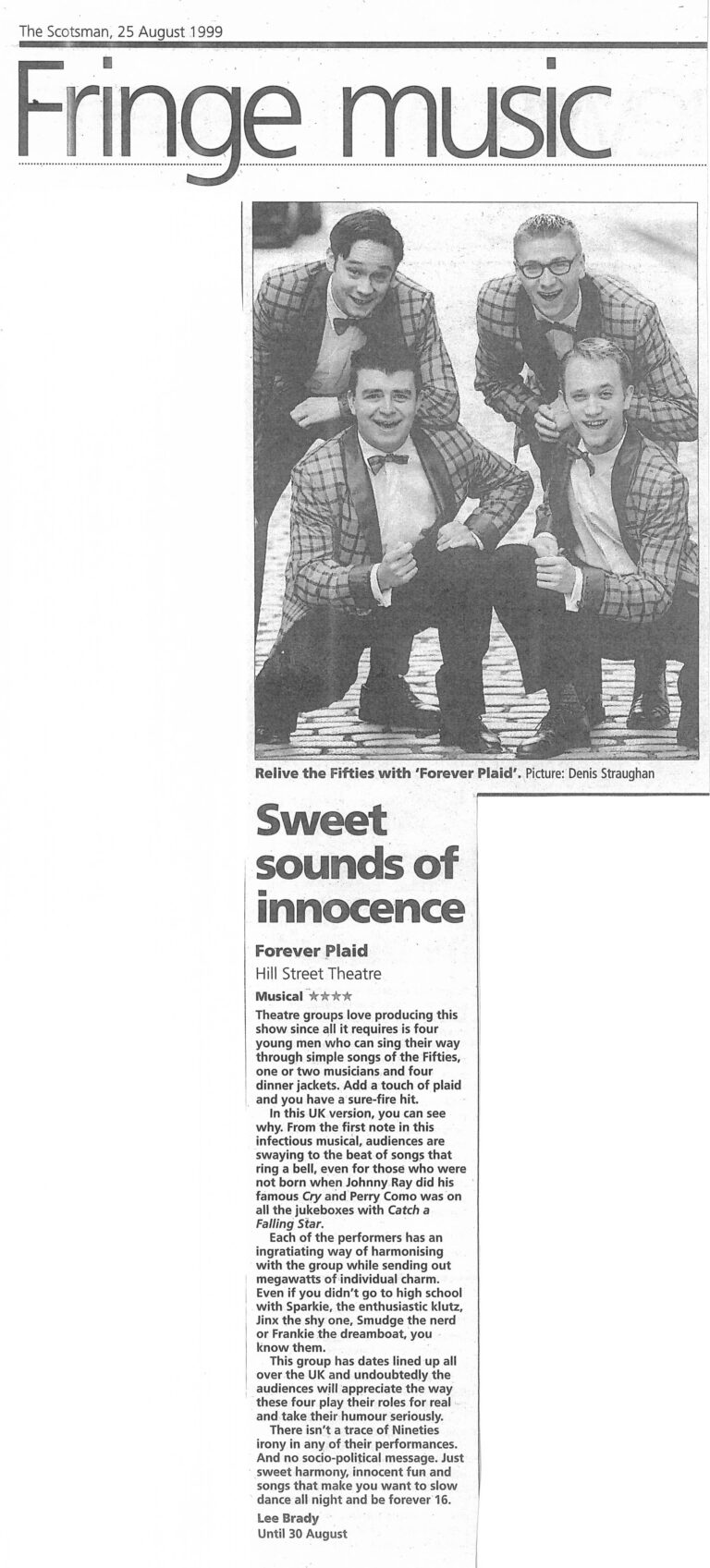
The Grapevine
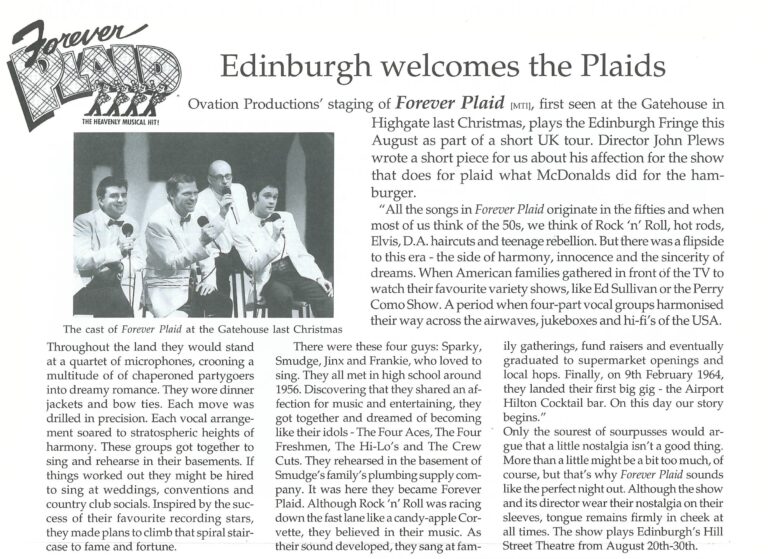
Blackpool Gazette
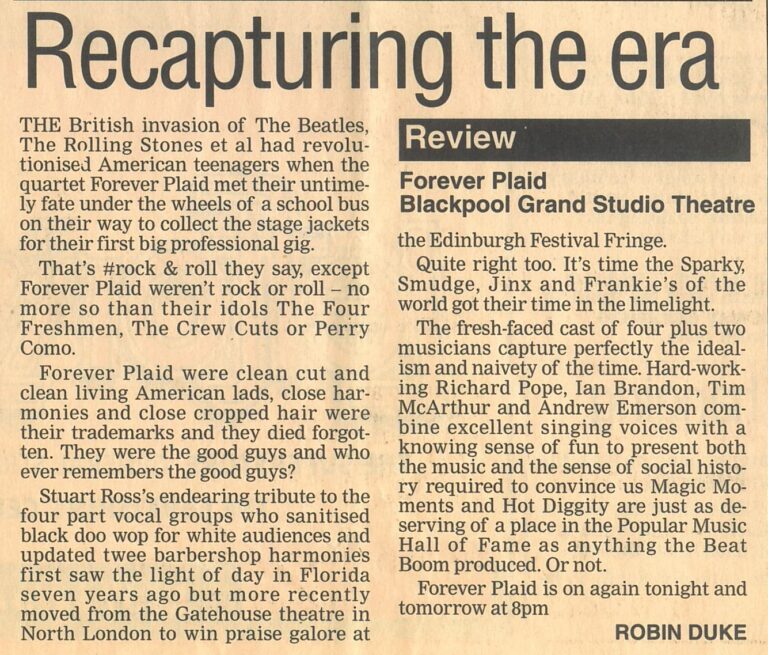
☆☆☆☆
Forever Plaid are like an American, 1960s Boyzone, but instead of pop balladry, they deal in vocal harmonies. This dose of feelgood entertainment tells the tale of four high school buddies desirous of emulating the successes of the honey-voiced groups they idolize. A tongue-in-cheek homage to the skill of these combos, much of this musical’s humour comes from innuendo and the acknowledgement of the fact that their neat little dance routines were corny.
The acting in this production’s every bit as polished as the singing (which is excellent) and there’s even the opportunity for an audience member to strut their stuff on-stage. Class.
Feast of music from the ‘50s and ‘60s
Forever Plaid comes to Trinity theatre and Arts Centre, Tunbridge Wells on Wednesday and anyone who loves the music of the ‘50s and ‘60s should put this date in their diary.
The story in simple. Sparky, Smudge, Frankie and Jinx met in 1956
They had one thing in common – they loved to sing.
In February 1964 they are on their way to their first big gig when they are all killed in a car crash.
But through the wonders of modern science they are given the opportunity to perform the gig they never got to do whilst alive.
The American musical includes many songs which were top ten hits in the ‘50s and ‘60s. Catch a Falling Star, Three Coin in a Fountain, Perfidia, Love is a Many Splendored Thing and Chain Gang are just some of the numbers from this fantastic feel-good piece of musical theatre.
A nostalgic dream
Four persons, superb vocal harmonies, some accompanying piano and guitar arrangements and witty humour characterize the highly acclaimed Forever Plaid. The show has been a surefire hit both in London’s West End and on New York’s Broadway.
Vocal harmony bands were all the range in the Fifties just before the onset of rock and roll. They may have not revolutionized the musical scene, since most of these acts were inspired by the crooning and melodic abilities of post-World War II singers.
Forever Plaid acknowledges this and even paid tribute to one leading octogenarian crooner, Perry Como. Yet, many coeval harmony acts sang so beautifully and enchanted audiences for many years. Back in the fifties such talents sprouted ten a penny yet few were those who managed to show real talent and zeal.
Forever Plaid emphasizes simplicity. In many ways it is a wry alternative to Grease. The title itself is a pun; it defines something which has remained popular and has been played ever since yet, at the same time, it refers to a style which during the Fifties found its way on hair-styles, hand-bags, clothes, curtains, car-upholstery, wrapping and many other items. And indeed, this presentation featured many anecdotes that were spun around this title. Some like Plaid to be with You or The Good, The Plaid and the Ugly, which is a play on words on Ennio Morricone’s song, are direct. Others, like their reference to the Caribbean Boat Song, are more articulate and intriguing.
This musical revolves around the story of four different characters – Sparkie, Jinx, Smudge and Frankie, each reflects a different personality and aspiration. However, all four guys loved singing. They met one another in high school around 1956. Soon, they found out that they shared a love for music and entertaining and so, they got together and dreamt of becoming stars like their idols.
Thereafter they developed and honed their sound and sang at family gatherings, fund-raisers and various other activities. In their heyday, vocal harmony bands kept a relatively good profile and soon won plaudits from middle class America. Eventually vocal harmony arrangements characterized the sound of the Beach Boys who cleverly fused this style with rock and roll.
Throughout their show, the performers showed their mettle with fine brilliant harmony and part vocal, part-humorous interpretations of many classic Fifties song. Like many other four-part harmony groups, Forever Plaid soar to stratospheric heights of harmony and seen ready to take on the world in much the same style as their mentors.
The musical’s presentation allows for appreciation and understanding of what Fifties vocal harmony music represented, more than just a tribute show featuring hits like Catch a Falling Star Three Coins in a Fountain and Shangri-La, Forever Plaid excel because they throw in innuendos which are non-controversial and refined. This complies with the strict norms that pervaded the media more than 40 years ago.
In those relatively prudish times, a more articular approach was demanded. The acting is every bit as polished as the singing and certainly reflects dedication and knowledge which not even a few rhythm and blues vocal harmony revival bands possess.
This is even more significant when one considers that the interpreters are British, not Americans, and almost all the top vocal harmony acts originated from the USA. Not surprisingly, Forever Plaid ran the gamut of Tin Pan Alley standard classics like Webster and Fain’s Love is a Many Splendored Thing, Hollmann and Manning’s Hot Diggity, the evergreen Three Coins in a Fountain. They also did a few rarities and interpreted some songs which are not exactly vocal harmony arrangements, Sam Sooke’s Chain Gang and the Beatles’ She Loves You are two cases in point. This isn’t really surprising. Cooke was a one-man vocal harmony show whereas the Beatles has one of their songs Yesterday covered by a latter-day vocal harmony band Boyz II Men.
In typical deft cabaret style, the foursome and their accompanying piano players quickly recalled Fifties’ entertainment as they mimicked the Ed Sullivan Show, the America’s top nationwide TV programme. However Forever Plaid’s strength also lies in its acting and interacting roles.
The performers got what they wanted from their audience. They asked for a young pianist and managed to get one to perform some notes on stage, they passed over batons and even involved the ushers. This all sounds simplistic, but it was so skillfully done.
And for those who appreciate sheer eloquence, toward the end there was an intelligent and brilliantly executed monologue delivered by Frankie. It features puns, cosmic allusions and illusions bases on musical notes. One this fantasy trip was over, only the memories of that classic, hopeful era ensue. They also ensure with aspiring musicians who dream of making the big time.
